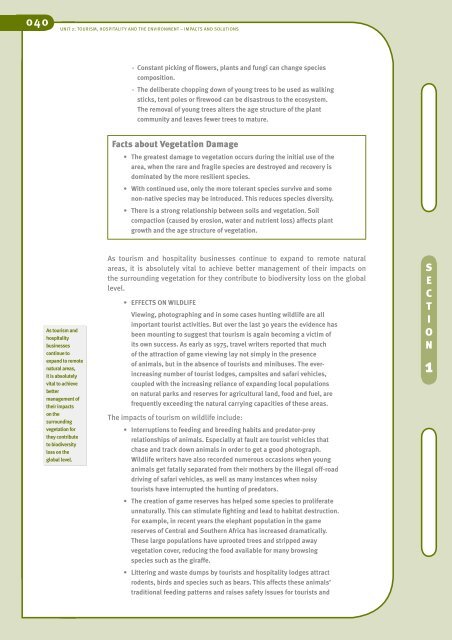Online version: PDF - DTIE
Online version: PDF - DTIE
Online version: PDF - DTIE
Create successful ePaper yourself
Turn your PDF publications into a flip-book with our unique Google optimized e-Paper software.
040<br />
UNIT 2: TOURISM, HOSPITALITY AND THE ENVIRONMENT – IMPACTS AND SOLUTIONS<br />
- Constant picking of flowers, plants and fungi can change species<br />
composition.<br />
- The deliberate chopping down of young trees to be used as walking<br />
sticks, tent poles or firewood can be disastrous to the ecosystem.<br />
The removal of young trees alters the age structure of the plant<br />
community and leaves fewer trees to mature.<br />
Facts about Vegetation Damage<br />
• The greatest damage to vegetation occurs during the initial use of the<br />
area, when the rare and fragile species are destroyed and recovery is<br />
dominated by the more resilient species.<br />
• With continued use, only the more tolerant species survive and some<br />
non-native species may be introduced. This reduces species diversity.<br />
• There is a strong relationship between soils and vegetation. Soil<br />
compaction (caused by erosion, water and nutrient loss) affects plant<br />
growth and the age structure of vegetation.<br />
As tourism and<br />
hospitality<br />
businesses<br />
continue to<br />
expand to remote<br />
natural areas,<br />
it is absolutely<br />
vital to achieve<br />
better<br />
management of<br />
their impacts<br />
on the<br />
surrounding<br />
vegetation for<br />
they contribute<br />
to biodiversity<br />
loss on the<br />
global level.<br />
As tourism and hospitality businesses continue to expand to remote natural<br />
areas, it is absolutely vital to achieve better management of their impacts on<br />
the surrounding vegetation for they contribute to biodiversity loss on the global<br />
level.<br />
• EFFECTS ON WILDLIFE<br />
Viewing, photographing and in some cases hunting wildlife are all<br />
important tourist activities. But over the last 30 years the evidence has<br />
been mounting to suggest that tourism is again becoming a victim of<br />
its own success. As early as 1975, travel writers reported that much<br />
of the attraction of game viewing lay not simply in the presence<br />
of animals, but in the absence of tourists and minibuses. The everincreasing<br />
number of tourist lodges, campsites and safari vehicles,<br />
coupled with the increasing reliance of expanding local populations<br />
on natural parks and reserves for agricultural land, food and fuel, are<br />
frequently exceeding the natural carrying capacities of these areas.<br />
The impacts of tourism on wildlife include:<br />
• Interruptions to feeding and breeding habits and predator-prey<br />
relationships of animals. Especially at fault are tourist vehicles that<br />
chase and track down animals in order to get a good photograph.<br />
Wildlife writers have also recorded numerous occasions when young<br />
animals get fatally separated from their mothers by the illegal off-road<br />
driving of safari vehicles, as well as many instances when noisy<br />
tourists have interrupted the hunting of predators.<br />
• The creation of game reserves has helped some species to proliferate<br />
unnaturally. This can stimulate fighting and lead to habitat destruction.<br />
For example, in recent years the elephant population in the game<br />
reserves of Central and Southern Africa has increased dramatically.<br />
These large populations have uprooted trees and stripped away<br />
vegetation cover, reducing the food available for many browsing<br />
species such as the giraffe.<br />
• Littering and waste dumps by tourists and hospitality lodges attract<br />
rodents, birds and species such as bears. This affects these animals’<br />
traditional feeding patterns and raises safety issues for tourists and<br />
S<br />
E<br />
C<br />
T<br />
I<br />
O<br />
N<br />
1
















